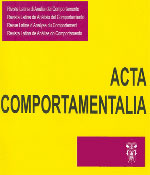Development and evaluation of a software for programmed instruction
Main Article Content
Abstract
In this study it was developed and evaluated a computerized system developed according to principles of programmed instruction to teach concepts of Experimental Analysis of Behavior. Planning instruction for conceptual behavior involves the use of effective forms of teaching developed in empirical research. For programming instruction purposes conceptual behavior here is taken in the acception of intraverbal operants specific to a verbal comunity, and the principle that dividing the teaching material in small parts and requiring mastering of the basic concepts before advancing to complex ones results in less errors and greater accuracy was followed. Previous studies evaluated diferences in acquisition of scientific conceptual behavior when using instructed tasks or consequencing verbal behavior, showing different acquisition patterns in each procedure. The effectiveness of the system for teaching and differences in the acquisition of conceptual behavior in tasks of definitions-choice or giving examples of scientific concepts were accessed. Results indicated that the system was effective to teach and evaluate acquisition of conceptual behavior. The definitions-choice task was more effective than giving examples. Data have implications for effective teaching of scientific concepts. Improvements of the system, including aditional feedback to errors are advanced.
Article Details
How to Cite
Brandão Marques, L., & de Faria Galvão, O. (2011). Development and evaluation of a software for programmed instruction. Acta Comportamentalia, 18(3). Retrieved from https://revistas.unam.mx/index.php/acom/article/view/24310
Citas en Dimensions Service

<a rel="license" href="http://creativecommons.org/licenses/by-nc-sa/4.0/"><img alt="Licencia de Creative Commons" style="border-width:0" src="https://i.creativecommons.org/l/by-nc-sa/4.0/88x31.png" /></a><br />Este obra está bajo una <a rel="license" href="http://creativecommons.org/licenses/by-nc-sa/4.0/">licencia de Creative Commons Reconocimiento-NoComercial-CompartirIgual 4.0 Internacional</a>.
